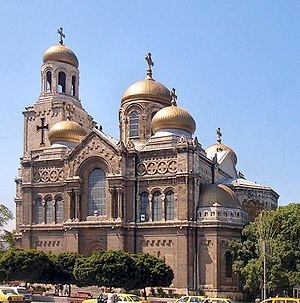

Historians, such as Carroll Quigley in "The Evolution of Civilizations", contend that Western civilization was born around AD 500, after the total collapse of the Western Roman Empire, leaving a vacuum for new ideas to flourish that were impossible in Classical societies. Gold and garnet cloisonné (and mud), military fitting from the Staffordshire Hoard before cleaning Through extensive imperialism, colonialism and Christianization by some Western powers in the 15th to 20th centuries and later exportation of mass culture, much of the rest of the world has been extensively influenced by Western culture, in a phenomenon often called Westernization. In the modern era, Western culture has been heavily influenced by the Renaissance, the Ages of Discovery and Enlightenment and the Industrial and Scientific Revolutions. Western civilization is also strongly associated with Christianity (and to a lesser extent, with Judaism), which is in turn shaped by Hellenistic philosophy and Roman culture. It originated in the Mediterranean basin and its vicinity Ancient Greece and Ancient Rome are generally considered to be the birthplaces of Western civilization-Greece having heavily influenced Rome-the former due to its impact on philosophy, democracy, science, aesthetics, as well as building designs and proportions and architecture the latter due to its influence on art, law, warfare, governance, republicanism, engineering and religion. Western culture was influenced by many older civilizations of the ancient Near East, such as Canaan, Minoan Crete, Sumer, Babylonia, and also Ancient Egypt. 3.5 Enlightenment (17th–18th centuries).

3.2 Ancient Roman world (6th century BC – AD 395–476).3.1 Ancient Greek and Hellenistic worlds (13th–1st centuries BC).This is most evident in Australia and New Zealand's inclusion in modern definitions of the Western world: despite being part of the Eastern Hemisphere these regions and those like it are included due to its significant British influence deriving from the colonisation of British explorers and the immigration of Europeans in the 20th century which has since grounded the country to the Western world politically and culturally. In modern usage, Western world sometimes refers to Europe and to areas whose populations have had a large presence of particular European ethnic groups since the 15th century Age of Discovery. For Rouquié, Latin America is the " Third World of the West."īy the mid-20th century, Western culture was exported worldwide through the emergent mass media: film, radio, television and recorded music and the development and growth of international transport and telecommunication (such as transatlantic cable and the radiotelephone) played a decisive role in modern globalization. For Huntington, Latin America (dark green) was part of the West or a descendant civilization that was twinned to it. " Western Christian civilization" (red) and " Eastern Christian civilization" (brown), according to Samuel Huntington. Running parallel to both the rise of the United States as a great power, and the development of communication and transportation technologies "shrinking" the distance between both shores of the Atlantic Ocean, the aforementioned country became more prominently featured in conceptualizations of the West. Transformed from a directional concept to a socio-political concept and with the backdrop of the perception of an increasing acceleration of time, the idea of the West was temporalized and rendered as a concept of the future ( German: Zukunftsbegriff) bestowed with notions of progress and modernity. Used to develop national identities, the overarching concept of the West was forged in opposition to ideas such as "Russia", "the East", "the Orient", "Eastern barbarism", "Oriental despotism", or the " Asiatic mode of production". The concept of the Western part of the earth has its roots in the theological, methodological and emphatical division between the Western Roman Catholic and Eastern Orthodox Churches. In turquoise are Latin America and the Orthodox World, which are either a part of the West or distinct civilizations intimately related to the West. Huntington's 1996 Clash of Civilizations.


 0 kommentar(er)
0 kommentar(er)
